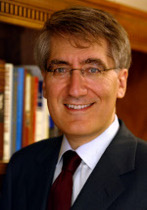Robert P. George, the Herbert W. Vaughan Senior Fellow at the Witherspoon Institute, McCormick Professor of Jurisprudence at Princeton University, Visiting Professor at Harvard Law School, and Director of the James Madison Program in American Ideals and Institutions at Princeton, was elected Tuesday, July 23, to serve as Chair of the United States Commission on International Religious Freedom (USCIRF). Professor George was appointed to the Commission in 2012 by Speaker of the House John Boehner and is serving his first term as a Commissioner.
Dr. Katrina Lantos Swett, USCIRF’s outgoing Chair and an appointee of Senate Majority Leader Harry Reid, announced Professor George’s selection. “I have been honored to work alongside Professor George this past year in the struggle to guarantee religious freedom abroad for people of every faith and shade of belief. He is a true human rights champion, whose compassion for victims of oppression and wisdom about international religious freedom shine through all we have accomplished this past year. Our bipartisan Commission is united in its admiration for George’s skills as an advocate and leader of the international religious freedom movement. The Commission is eager to continue its work under his able leadership.”
Commenting on his election as Chair of USCIRF, George said, “I am deeply honored that my colleagues have entrusted me with this position of leadership. I have big shoes to fill: Dr. Lantos Swett is a visionary leader who brings people together and empowers them in support of international religious freedom. As our leader, she tirelessly and effectively promoted this most fundamental of human rights. It will be my constant endeavor to live up to her outstanding example as USCIRF works to ensure that the cause of religious freedom, understood in its most robust sense, is given the high priority it deserves in the formation and execution of U.S. foreign policy. While much has been accomplished, much remains to be done.”
George has previously served on the President’s Council on Bioethics and as a presidential appointee to the U.S. Commission on Civil Rights. He also has served on UNESCO’s World Commission on the Ethics of Scientific Knowledge and Technology, and is a member of the Council on Foreign Relations. George is a former Judicial Fellow at the Supreme Court of the United States, where he received the Justice Tom C. Clark Award.
George is a recipient of many notable honors, including the United States Presidential Citizens Medal, the Honorific Medal for Human Rights of the Republic of Poland, and the Canterbury Medal from the Becket Fund for Religious Liberty. He serves on the boards of the Ethics and Public Policy Center and the Institute on Religion and Democracy, as well as the advisory committees of First Things magazine and the William E. and Carol G. Simon Center on Religion and the Constitution at the Witherspoon Institute.
An award-winning teacher at Princeton, George is a prolific writer in the areas of moral and political philosophy, philosophy of law, and constitutional law and theory. His most recent book is Conscience and Its Enemies (ISI Books, 2013). His scholarly articles have appeared in the Harvard Law Review, the Yale Law Journal, the Columbia Law Review, and other leading journals of law, philosophy, and political science. His writings also have appeared in the New York Times, the Washington Post, the Wall Street Journal, National Review, the Boston Review, and the Times Literary Supplement.
A graduate of Swarthmore College and Harvard Law School, George holds a master’s degree in theology from Harvard and a doctorate in philosophy of law from Oxford University, as well as honorary doctorates of law, letters, science, ethics, divinity, civil law, humane letters, and juridical science.



